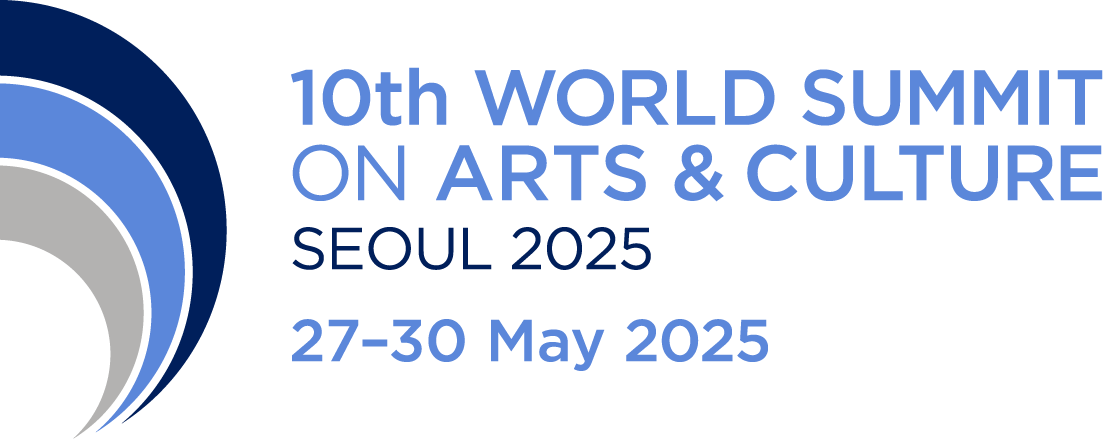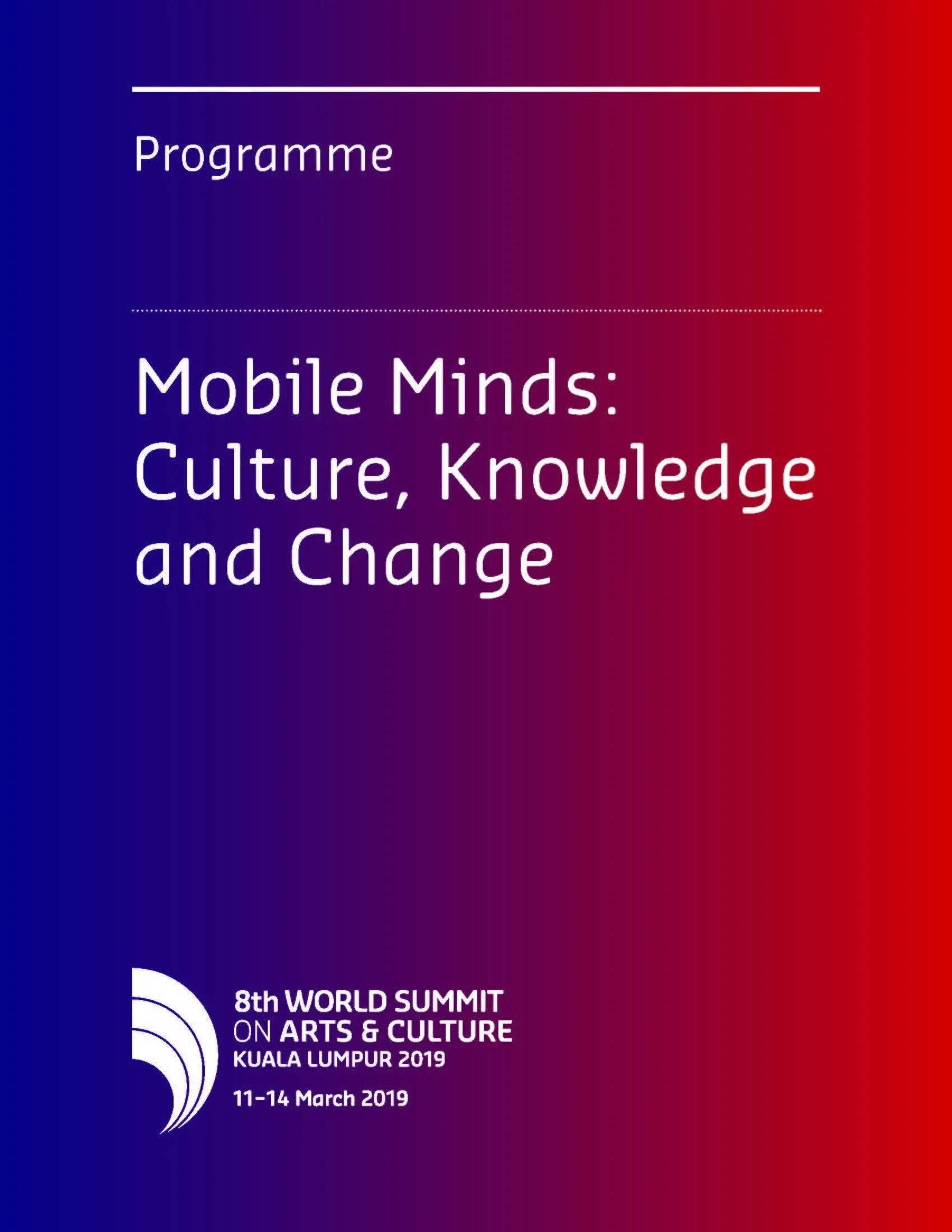Programme
The 8th World Summit programme interrogated the theme Mobile Minds: Culture, Knowledge and Change. Throughout the Summit participants explored existing knowledge and practices; considered the challenges we face in times of change; and identified creative ways to respond using traditional, contemporary and future-oriented perspectives. We also examined how we, as an international community, can work together to actively lead change. Aligned with IFACCA’s new leadership and fresh approach, the programme embraced participation and recognised the unrivalled expertise of delegates by actively involving them in long table discussions, a Lepak session where delegates convened in smaller groups to address important questions and – for the first time – a series of participatory creative workshops.
The 8th World Summit programme was developed in collaboration with an International Programme Advisory Committee (IPAC), comprising leaders from across the international arts and culture sector, along with representatives from the National Department for Culture and Arts (JKKN), Malaysia and the Secretariat of the International Federation of Arts Councils and Culture Agencies (IFACCA), as the co-hosts of the Summit. The introduction of a Committee to programme the World Summit for 2019 reflected a new direction for the Federation, prioritising working collaboratively and increasing opportunities for peer exchange within our international network of members and experts.
The members of the International Programme Advisory Committee were:
- IPAC Chair - Toni Attard (Malta), Founder and Director of Culture Venture, an arts advisory and management firm. He was the first Director of Strategy at Arts Council Malta and was responsible for the leadership of the strategy team that created and developed the Council's five year strategy and served as an advisor to the Ministry of Finance to co-author the creative economy strategy and was one of the authors of Malta’s national cultural policy.
- Olu Alake (United Kingdom), Director of UK-based cultural consultancy November Ventures who has developed and delivered cultural policy plans and programmes, arts and heritage initiatives across Europe, the Caribbean, and Africa; and held senior management positions in the UK’s Equalities and Human Rights Commission, Commission for Racial Equality and Arts Council England.
- Abdullah Alkafri (Syria), a playwright, cultural activist and founding member and Executive Director of Ettijahat-Independent Culture, a Syrian cultural organisation founded in the end of 2011 to play a role in building a dynamic, democratic and diverse Syrian culture.
- Dr Wulan Dirgantoro (Australia / Indonesia), an academic whose work focusses on Southeast Asia and the intersection between feminism and memory, and how the state, political and cultural institutions as well as art agencies are interlinked in the arena of cultural production.
- Joy Mboya (Kenya), performer, cultural activist and Executive Director of The GoDown Arts Centre in Nairobi, Kenya, a site for artistic experimentation, cross-sector partnerships and creative collaboration.
- Kathy Rowland (Malaysia / Singapore), Managing Editor of ArtsEquator.com, which she co-founded with Jenny Daneels, a site dedicated to supporting and promoting arts criticism with a regional perspective in Southeast Asia.
- Carlos J. Villaseñor Anaya (Mexico), an independent international consultant on cultural based development policies, with expertise on the 2003 (Intangible Heritage) and 2005 (Diversity of Cultural Expressions) UNESCO Conventions.
- Salehhuddin Md Salleh (Malaysia), Director of Policy and Research Division for the National Department for Culture and Arts, Ministry of Tourism, Arts and Culture Malaysia.
The National Department for Culture and Arts (JKKN) was represented by Salehhuddin Md Salleh, Director Policy and Research Division; and IFACCA was represented by Magdalena Moreno Mujica, Executive Director and Meredith Okell, Director of Communications and Engagement.
Programme Participants
The 8th World Summit included keynote sessions with:
Professor Karima Bennoune (Algeria/USA), UN Special Rapporteur in the field of cultural rights and Professor of Law and Martin Luther King, Jr. Hall Research Scholar at the University of California-Davis School of Law, who challenged delegates to reflect on the conditions that affect us through the lens of cultural rights, the transmission of knowledge and wisdom, and participation; and questioned what drives change and to what extent is change global?
Ashkan Fardost (Sweden), a technology and digitalisation expert with a unique perspective on the (r)evolution of the internet and digitalisation, who presented a provocation that interrogated what it means to be human in the digital age; shared his perspective on the internet as a psychological, sociological and anthropological phenomenon that continues to evolve and change the dynamic of the world; and challenged our focus on how artistic, cultural and creative practices respond.
The final day also included a main stage In-conversation session, (Re)Imagining Our Futures, which brought together internationally acclaimed architect and philanthropist Hijjas Kasturi and award-winning author Tash Aw to share their perspectives on the future of arts and culture in our societies.
The programme included more than 80 speakers representing 47 countries, including:
Irene Agrivina Widyaningrum (Indonesia)
Founder and Director, House of Natural Fiber (HONF)
Olu Alake (United Kingdom)
Director, November Ventures
Abdullah Alkafri (Syria)
Executive Director, Ettijahat-Independent Culture
Korkor Amarteifio (Ghana)
Executive Director, Accra Symphony Orchestra
Kiley Arroyo (USA)
Head of Strategic Data and Knowledge, International Federation of Arts Councils and Culture Agencies (IFACCA)
Toni Attard (Malta)
Founder and Director, Culture Venture
Tash Aw (Malaysia)
Writer
Kampire Bahana (Uganda)
DJ and Writer
Khaled Barakeh (Syria / Germany)
Artist and cultural activist
Dr Karima Bennoune (Algeria/USA)
UN Special Rapporteur in the field of cultural rights
Caroline Bowditch (Australia)
Executive Director, Arts Access Victoria
Simon Brault, O.C., O.Q. (Canada)
Director and CEO Canada Council for the Arts
Jairo Castrillón Roldán (Colombia)
Journalist
Taeyoon Choi (South Korea / USA)
Artist and Co-Founder of School of Poetic Computation
Kristin Danielsen (Norway)
Director, Arts Council Norway
Marion D'cruz (Malaysia)
Founding member of Five Arts Centre
Mauricio Delfín (Peru)
Researcher and Promoter of Open Government in Cultural Sectors, Director, Asociación Civil Solar
Mary Ann Devlieg (Italy)
Co-founder of IARA, International Arts Rights Advisors
Dr Wulan Dirgantoro (Australia / Indonesia)
Academic
Diane Dodd (Spain)
Regional Adviser, International Federation of Arts Councils and Culture Agencies (IFACCA)
Khadija El Bennaoui (Morocco / Belgium)
Director, Art Moves Africa (AMA)
Basma El Husseiny (Egypt)
Director, Action for Hope
Staffan Forssell (Sweden)
Director General of the Swedish Arts Council
Liyana Fuad (Indonesia)
Artist and chef
George Gachara (Kenya)
Managing Partner, HEVA Fund LLP
Professor Amareswar Galla (India)
Chief Curator, Amaravathi Heritage Town, India; Executive Director, International Institute for the Inclusive Museum, Australia/USA
Andrés Gribnicow (Argentina)
Secretary for Culture and Creativity, Ministry of Education, Culture, Science and Technology, Presidency of Argentina
Tanja Hichert (South Africa)
Research Associate at the Centre for Complex Systems in Transition at the School of Public Leadership, Stellenbosch University
Fu Jiebei (China)
Founder and General Manager of Shenzhen HongYan Tech. Co., Ltd.
Dr Lucina Jiménez (Mexico)
Director General, National Institute of the Arts (INBA)
AR. Hijjas Bin Kasturi AM (Malaysia)
Principal Director of Hijjas Kasturi Associates Sdn
Gülgün Kayim (USA)
Director, Arts, Culture and the Creative Economy, City of Minneapolis
Saba Khalid (Pakistan)
Founder and Chief Editor, Aurat Raaj
Levan Kharatishvili (Georgia)
Deputy Minister, Ministry of Education, Science, Culture and Sport of Georgia
Eddin Khoo (Malaysia)
Founder-Director, PUSAKA
Kenneth Kwok (Singapore)
Assistant Chief Executive Officer (Planning & Engagement), National Arts Council of Singapore
Mercedes Lerea (Paraguay)
Director General (Planning), National Secretary of Culture
Angela Martins (Ethiopia)
Head of Culture Division, Social Affairs Department, African Union Commission
Joy Mboya (Kenya)
Executive Director, The GoDown Arts Centre
Orlaith Mcbride (Ireland)
Director, Arts Council/An Chomhairle Ealaíon, Ireland
Felipe Mella Morales (Chile)
Executive Director of the Gabriela Mistral Cultural Center
Simon Mellor (England)
Deputy Chief Executive, Arts and Culture, Arts Council England
Dato' Dr Faridah Merican (Malaysia)
Co-Founder & Executive Producer, The Actors Studio, klpac, penangpac
Magdalena Moreno Mujica (Chile / Australia)
Executive Director, International Federation of Arts Councils and Culture Agencies (IFACCA)
Professor Dato' Dr Mohamed Najib Bin Ahmad Dawa (Malaysia)
Director General, National Art Gallery, Malaysia
Helena Nassif
Managing Director Culture Resource (Al Mawred Al Thaqafy)
Nguyen Phuong Hoa (Viet Nam)
Deputy Director General, International Cooperation Department, Ministry of Culture, Sports and Tourism, Viet Nam
Georgia Nicolau (Brazil)
Director and Founder, Instituto Procomum
Anette Novak (Sweden)
Director General, Swedish Media Council
Ojoma Ochai (Nigeria)
Director Programmes Nigeria, British Council
Professor Justin O’connor (Australia)
Professor of Cultural Economy, University of South Australia
Jordi Pascual
Coordinator of the Committee on Culture of the world organisation of United Cities and Local Governments (UCLG)
Nirvana Persaud (Guyana)
CEO, National Trust of Guyana
Dimas Prasetyo Muharam (Indonesia)
Founder and CEO Kartunet.com
Tiago Prata (Sweden)
Journalist and Cultural Manager
Phloeun Prim (Cambodia)
Executive Director, Cambodian Living Arts
Diane Ragsdale (USA)
Assistant Professor and Program Director, Arts Management & Entrepreneurship, The New School
Tan Sri Norliza Binti Rofli (Malaysia)
Director-General, National Department for Culture and Arts, Ministry of Tourism, Arts and Culture, Malaysia
Frances Rudgard (Cambodia)
Managing Director, Cambodian Living Arts
Cathy Runciman (United Kingdom)
Co-founder, Atlas of the Future
Dr Mamta Sagar (India)
Poet, Playwright and Translator
Consuelo Sáizar (Mexico / UK)
MPhil, Doctoral Researcher in Sociology, University of Cambridge
Patrick Sam (Namibia)
Chairperson National Arts Council of Namibia (NACN)
Izan Satrina Mohd Sallehuddin (Malaysia)
Founding CEO of CENDANA
Tristan Schultz (Australia)
Co-Director, Relative Creative
Anupama Sekhar (India/Singapore)
Director, Culture Department, Asia-Europe Foundation (ASEF)
Patrick Shannon (Canada)
Creative Social Innovator
Clare Shine (Austria)
Vice President and Chief Program Officer, Salzburg Global Seminar
Ragnar Siil (Estonia)
Founder and Managing Partner of Creativity Lab
Dr María Paulina Soto Labbé (Chile / Ecuador)
Deputy Vice-Chancellor of the University of the Arts, Ecuador and Director of the Cultural Corporation of the University of Santiago, Chile
Daliana Suryawinata (Indonesia)
Co-Founder of SHAU
Faumuina Felolini Maria Tafuna'i (Vanuatu)
Chairperson of Further Arts
Paula Tuovinen (Finland)
Director, Arts Promotion Centre Finland
Dea Vidović (Croatia)
Director of Kultura Nova Foundation
Carlos J. Villaseñor Anaya (Mexico)
International consultant in culture and sustainable development. Member of the Panel of Experts of the 2005 UNESCO Convention
Stephen Wainwright (New Zealand)
Chief Executive, Creative New Zealand
Dr Wendy Were (Australia)
Executive Director, Strategic Development and Advocacy, Australia Council for the Arts
James Williams (United Kingdom)
Writer and Academic
Cultural Programme
Alongside the official conference programme, the cultural programme for delegates included:
Opening Ceremony
The official Opening Ceremony, which took place in the Perdana Botanical Garden, situated in the Heritage Park of Kuala Lumpur.
Special Co-created Performance
Tidal Constellations, a collaboration between BANDALOOP (USA) and ASK Dance Company (Malaysia), as a special co-created performance performed in the multi-tiered atrium of the National Gallery. The companies brought elements of their own repertoires – including BANDALOOP’s signature vertical dance, adapted to the atrium – and presented new collaborative work, symbolising partnership with respect and humility. The collaborative performance between BANDALOOP and ASK Dance Company was made possible with generous support from the National Endowment for the Arts (USA), the U.S. Department of State’s Arts Envoy programme and the U.S. Embassy Kuala Lumpur.
Gala Dinner
The Gala Dinner, a celebratory evening event prior to the closing day of the Summit, where delegates enjoyed welcome drinks and networking, followed by a formal seated dinner and performances from local artists.
A Medley of Malaysian Dances or ‘Rampai Sari Tari Malaysia’, a production that highlighted the diversity of traditional dances that are rarely performed in Malaysia. The production drew from several repertoires such as the authentic Malay classical dances, those historically performed at the Malay courts.
Titik Mengalai by Persatuan Anak-Anak Sabah (Perkasa) | 15 & 16 March
Titik Mengalai, a traditional performance by Persatuan Anak-Anak Sabah (PERKASA) originating from Sabah, which is also known as the ‘land below the wind’. Sabah is the second largest state in Malaysia after Sarawak and is home to various ethnicities and cultures. The original population comes from diverse background comprising at least 30 tribes who speak more than 50 languages and more than 90 dialects.
Find full information on the Cultural Programme within the 8th World Summit Programme.







